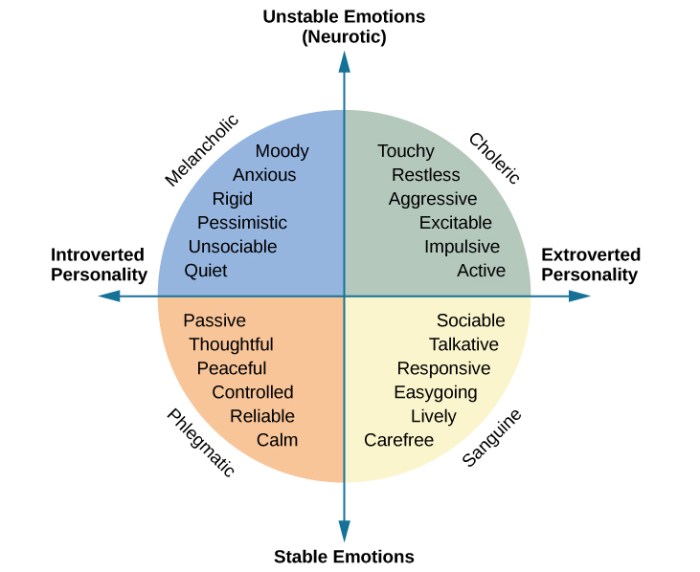The eysencks believed that extraversion and emotionality are – As the Eysencks’ Theory takes center stage, this discourse embarks on an intellectual journey to unravel the intricate relationship between extraversion and emotionality, shedding light on their profound impact on human behavior and personality.
The Eysencks’ groundbreaking work posits that extraversion and emotionality are fundamental dimensions of personality, shaping our interactions with the world and influencing our emotional experiences. This theory has garnered widespread recognition and continues to serve as a cornerstone in the field of psychology.
Definition of Extraversion and Emotionality

Extraversion is a personality trait that refers to an individual’s tendency to seek out social interactions, enjoy excitement, and engage in impulsive behaviors. Extraverted individuals are often described as outgoing, talkative, and assertive.
Emotionality, on the other hand, is a trait that refers to an individual’s tendency to experience intense emotions and to react strongly to emotional stimuli. Emotionality is often associated with sensitivity, empathy, and vulnerability.
The Eysencks’ Theory of Personality
Hans and Sybil Eysenck proposed a theory of personality that identified three main dimensions of personality: extraversion, neuroticism, and psychoticism. Extraversion and neuroticism are considered to be the most important dimensions, with extraversion being the most studied.
According to the Eysencks, extraversion is determined by the level of cortical arousal in the brain. Extraverted individuals have lower levels of cortical arousal, which makes them more likely to seek out stimulation and excitement. Neuroticism, on the other hand, is determined by the level of limbic system activity in the brain.
Individuals with high levels of neuroticism are more likely to experience anxiety and fear.
Relationship between Extraversion and Emotionality
The Eysencks believed that extraversion and emotionality are inversely related. They argued that extraverted individuals are less emotional than introverted individuals. This is because extraverted individuals are more likely to engage in activities that distract them from their emotions, such as socializing or seeking out excitement.
There is some evidence to support the Eysencks’ claims. For example, one study found that extraverted individuals were less likely to experience negative emotions in response to stress.
Implications of the Eysencks’ Theory, The eysencks believed that extraversion and emotionality are
The Eysencks’ theory of personality has a number of practical implications. For example, the theory can be used to understand and predict behavior. For example, extraverted individuals are more likely to be successful in sales and marketing jobs, while introverted individuals are more likely to be successful in research and development jobs.
The Eysencks’ theory can also be used to develop interventions to help people change their personality traits. For example, if someone is too introverted, they may be able to learn to be more extraverted by participating in social activities.
FAQ Section: The Eysencks Believed That Extraversion And Emotionality Are
What is the central tenet of the Eysencks’ Theory?
The Eysencks’ Theory proposes that extraversion and emotionality are two fundamental dimensions of personality that influence our behavior and emotional experiences.
How are extraversion and emotionality related?
According to the Eysencks, extraversion is positively correlated with emotionality, meaning that individuals who are highly extroverted tend to experience emotions more intensely.
What are the practical implications of the Eysencks’ Theory?
The theory has implications for understanding and predicting behavior in various settings, including workplace performance, interpersonal relationships, and mental health.


